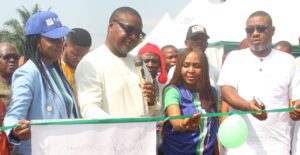How women are breaking age-long biases in Nigerian media industry
Abimbola Abatta and Anu Oyeleye
Amid concerted efforts geared towards empowering women as game-changers in the society, the fight to eradicate certain age-long biases against women is far from being a complete win.
In recent times, there has been an increase in conversations and debates bordering on gender issues in communities, workplaces, schools, politics, and other areas.
Stakeholders have done so much to engender initiatives targeted at promoting a world where women are allowed to function without limitations or prejudice, a world where the principles of equality and equity reign supreme, a world that is diverse, equitable, and inclusive, and most importantly, a world devoid of bias, stereotypes, and discrimination.
To celebrate the 2022 International Women’s Day and forge women’s equality, the United Nations (UN) adopted the theme, “Gender equality today for sustainable tomorrow.” And all over the world, the campaign theme #BreakTheBias has been making the rounds.
As part of the efforts to showcase how female journalists are breaking the bias as well as raise a community of female reporters with leadership prowess who can put conversations on violence against girls and women, criminal justice and human rights on the front burner, the United States mission in Nigeria, last week, hosted a panel discussion on women in journalism.
The hybrid event, which took place at the American Corner in Lagos, featured female journalists from various beats, including sports, business, and politics; female mass communication students; faculty members from journalism schools and female representatives from media development organisations.
The panellists at the event were CNN Africa Supervising Editor, Stephanie Busari; Deutsche Welle West Africa Correspondent, Amaka Okoye; SuperSport TV Host, Chisom Mbonu-Ezeoke, Arise TV Correspondent, Seyitan Atigarin, and Channels TV Foreign Affairs Editor, Amarachi Ubani (panel moderator).
Despite the undeniable fact that the existing system is skewed against women, the panellists are embodiments of women who are undaunted as they dismantle the deep-seated gender stereotypes while etching indelible impact in their careers.
Part of the panel discussions centred on the dearth of women in senior management positions in Nigerian newsrooms, gender equality, challenges and opportunities for women journalists, media freedom and the safety of female journalists, among others.
The speakers shared insights on their struggles and success stories as women journalists in Nigeria. They underscored how they had to defy all odds and work twice as hard as a man to achieve incredible feats in the field of journalism.
On her part, Busari of CNN emphasised that women must understand their self-worth while urging females to be courageous in venturing into specific journalism beats, which the society might perceive as men’s beats.
She said, “There is such gendered language around war for ladies even young girls will think why shouldn’t we accomplish this? It should not matter. It is a job; it is not a male or female reporter. It is a war reporter, so anybody can be a war reporter and go into conflict coverage; it is not just the men.”
For Amaka Okoye, women need to understand that feeling pain and showing empathy for victims does not equate weakness.
Okoye said this while sharing her experience working in conflict situations, like when she covered the kidnap of several schoolgirls in Jangebe, Zamfara State.
She encouraged women to embrace their gender while reporting as she also shared that it is therapeutic to be vulnerable and emotional at work.
While advocating the need for Nigerian media organisations to include mental health care as welfare for journalists, she said, “Therapy helps to completely detach from the trauma of conflict reporting.”
On conflict reporting, she said, “Learning a language or two will be beneficial. Dress appropriately to fit in the environment of conflict.
“As a woman, embrace your gender in the reporting. Some stories are not complete until they are complete. Have a quality support system because it matters in the long run. These are the people who will tell you to go ahead and not look back,” Okoye added.
According to Arise TV’s Atigarin, women need to encourage one another and appreciate their efforts.
While she shared her experience of covering the #EndSARS protests, Atigarin maintained that “irrespective of the field assigned to female journalists, there should be no limit whatsoever to what they can achieve.”
In her argument, Mbonu-Ezeoke of SuperSport TV said the work environment needs to be more conducive for female journalists in Nigeria.
“I think that the executives have to make it more conducive for women to move into the industry. We have to give women the same opportunity; nobody can tell me there are no competent women in any industry. So why not bring competent women and train them? Women do support women, and there are healthy and unhealthy competitions, both are fine,” she maintained.
She further advocated that “we have a duty to change the condescending narrative about women. We have to be deliberate in telling the story about women as they work ten times harder than men to get access to some opportunities.”
Against the backdrop that many often consider the sports beat exclusive to male journalists, she advised that women should look for a niche and apply the same work pressure as the men to be recognised.
She explained that she had to work for years to carve a niche as a sports reporter by being intentional despite unfavourable circumstances.
The panellists equally advanced that media executives should have a deliberate approach to women’s inclusion because women bring a different level of empathy to reporting.
In reaction to the fact that the population of women in the media industry is lower than that of men, the panellists tasked male journalists to be allies in improving women’s visibility in the industry.




